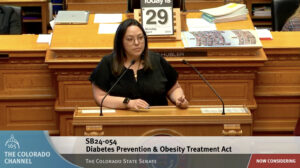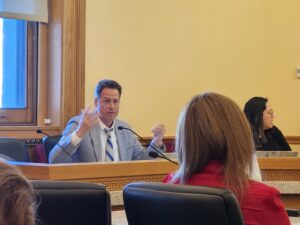Colorado senators are poised to pass a mandate for state-regulated public and private insurance plans to cover new anti-obesity drugs that could cost the state $200 million annually and raise private health-insurance premiums as much as $12 per person monthly.
Advocates for Senate Bill 54 argue the short-term expenses pale compared to long-term savings from treatment and prevention of diabetes, a disease with incalculable public-health costs ranging from blindness to amputations to greatly diminished quality of life. And senators from both parties have highlighted the bill as an example of why the state’s fiscal projections must be more dynamic and consider the cost savings of health-insurance mandates as well as the immediately required boost in spending.
Still, the nonpartisan Legislative Council estimated that with 200,000 Medicaid recipients eligible for weight-loss medication, SB 54 would cost the state $86.1 million for six months of enactment in next year’s budget and $199.6 million for its first full year in effect. North Carolina announced it is dropping coverage of the drugs Ozempic and Wegovy for state employees because of soaring costs, and Connecticut requires workers to participate in a clinical lifestyle management program if prescribed the drugs, according to Axios.
Costs of obesity treatment could impact private plans too
The fiscal note for SB 54 doesn’t calculate the costs to private insurance plans. But Colorado Association of Health Plans Executive Director Saskia Young said at the March 13 National Association of Benefits and Insurance Professionals Day at the Capitol a 36-month treatment with the new drugs costs about $46,000. And Sen. Jim Smallwood, a Douglas County Republican and 30-year insurance broker, said he’s been told holders of small-group and individual policies — those regulated by the state — could pay $7 to $12 a month more for the new benefit, whether or not they use it.
Colorado employers and insurers have not gotten into as many fights this year as they had in past sessions over proposed new mandates that they warned could raise health-insurance premiums for everyone, as they have been successful in pushing back against proposals like one that would have required insurers to include all the state’s primary-care doctors in all their networks. But SB 54 represents a potential significant cost that has spurred multi-faceted special concern about the bill.

Colorado state Sen. Julie Gonzales speaks about the obesity-treatment bill on the Senate floor Monday.
So, legislators sought a cost-benefit analysis from state regulators on exactly how significant the savings could be if hundreds of thousands of Coloradans gained access to these relatively now anti-obesity drugs — and were disappointed in what they received. Sen. Julie Gonzales, D-Denver, said during Senate debate on Monday that the 50-page analysis contained “about a paragraph on cost savings” and focused almost entirely on the increase in cost to insurers, leaving legislators to have to weigh the benefits on their own.
Legislators, department leaders clash
“We need to stop thinking about this as how much it will cost us for treatment but how much it is costing us already,” cosponsoring Sen. JoAnn Ginal, D-Fort Collins, said, noting that diabetes has an estimated $190 billion financial burden nationwide. “This is an extremely important bill if not the most important bill we can pass right now.”
Colorado Department of Health Care Policy and Financing leaders asked Ginal and cosponsoring Sen. Dafna Michaelson Jenet, D-Commerce City, to make changes to bring down the costs, the duo told the Senate Health & Human Services Committee on April 11. A major suggestion was to limit Medicaid benefits to lifestyle programs rather than actual prescription drugs, while another proposal would have required patients to have tested at a certain hemoglobin level that signals prediabetes to be eligible for the medication.
Smallwood said he’d never seen a requirement in law that predicates eligibility for medical treatment on the results of a test, and he compared it to covering chemotherapy only if a tumor reached a certain size. Gonzales, meanwhile, blasted the suggestion of allowing only lifestyle treatment rather than medication for Medicaid patients as offensive, saying it sent the message that the benefits of these new, seemingly effective drugs were only for people who could afford to pay for them.

Colorado state Sen. Jim Smallwood questions Sen. Dafna Michaelson Jenet about her obesity-treatment bill in the Senate Health & Human Services Committee on April 11.
“The amendments that were requested by the department in regard to this bill were some of the most shocking I’ve ever seen in my time in the Senate,” Gonzales said during floor debate Monday. “I can’t think of any other bill where we’ve said, ‘Have you tried eating salad — but we’re not going to treat your underlying cancer?’”
State officials told to find money for obesity treatment
In an unusual move, Gonzales added a fiscal note in the Senate Appropriations Committee on Thursday that directs the bill be implemented with existing funds — despite Legislative Council’s forecast that costs will rise to $247 million to Medicaid by fiscal year 2026-27. The state government already covers the drugs for employees on its insurance plan — a fact that Michaelson Jenet noted Monday as she told the Senate that taking one of the medications “has stopped my diabetes in its tracks.”
Sen. Barbara Kirkmeyer, R-Brighton, joined with Gonzales in her effort — also an unusual move — by saying that HCPF often has unspent money each year because of savings in its Medicaid program and that it could pay for rising medication costs from those funds. An amendment delayed the start of the benefits for both private and public insurance plans until January 2025, which will allow HCPF to get six months into the fiscal year that begins on July 1 to determine what money it has available, she added.
For all the focus on the disappointing cost-benefit analysis and the need to offer the drugs to Medicaid patients, however, little of the debate centered on what the new mandate could cost to private-plan insurers and the Coloradans who purchase those plans. And that is the thing that most worries insurers and employers, particularly during a time when cost of living is straining on Coloradans in areas ranging from housing to energy expenses.
What’s next for obesity treatment bill
Smallwood, who announced Monday that he will vote against SB 54 when it gets its likely final Senate vote on Tuesday, said he would support the bill if any analysis had shown the high-cost drugs will offset expenses by reducing diabetes treatment costs. However, no evidence has shown that will happen yet, and he is concerned both that the drugs’ initial efficacy could be short-lived and costly for insurers and that were the state to wait on the mandate, the costs of medication could fall naturally in the coming years.
“I feel like you can’t possibly vote on a bill like Senate Bill 54 without seeing both sides of the ledger,” Smallwood said.
If the Senate passes the proposal as expected, it still must make it through the House before the May 8 adjournment of the session. And then it must clear possibly its most significant obstacle — the veto pen of Gov. Jared Polis, who said back in 2020 that he would be reluctant to support insurance bills going forward that drive up the cost of health care.
